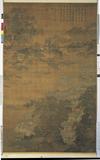藝苑藏真(下) 冊 宋林椿山茶霽雪
推薦分享
資源連結
連結到原始資料 (您即將開啟新視窗離開本站)後設資料
- 資料識別:
- 故畫001241N000000001
- 資料類型:
- 類型:繪畫
- 型式:靜態圖像
- 著作者:
- 林椿
- 主題與關鍵字:
- 茶花
- 出版者:
- 數位化執行單位:國立故宮博物院
- 格式:
- 本幅 24.8x24.8公分、對幅 24.8x24.8公分、全幅 38.5x80公分
- 關聯:
- 石渠寶笈續編(重華宮),第三冊,頁1681&*故宮書畫錄(卷六),第四冊,頁203&*1.童文娥,〈林椿山?霽雪〉,收入國立故宮博物院編,《宋代書畫冊頁名品特展》(臺北:國立故宮博物院,1995年初版一刷),頁292-293。 2.童文娥,〈「七十件書畫冊頁名品特展」精選(六) — 林椿山?霽雪〉,《故宮文物月刊》,第152期(1995年11月),頁83-85。 3.〈宋 林椿 山茶霽雪〉,收入譚怡令、劉芳如、林莉娜主編,《滿庭芳 歷代花卉名品特展》(臺北:國立故宮博物院,2010年十二月初版一刷),頁182。 &*林椿,生卒年不詳。浙江錢塘(今杭州)人。南宋孝宗淳熙年間(1174-1189)畫院待詔,工畫花鳥瓜果。 古人畫雪多以白山粉點為之,甚少強調質感。山茶是「二十四番花信風」小寒二候代表花,本幅三花,一仰一俯一含苞,無論描摹花心積雪、瓣緣凝霜,以及霜雪初晴結晶蓬鬆的樣子均極寫實,自古色艷莫過紅綠,襯以早降瑞雪的潔白脫俗。本幅選自〈藝苑藏真下冊〉,為宋代追求形似與詩意的典型作品。(20110102)&*Lin Chun (dates unknown) was a native of Qiantang (modern Hangzhou) in Zhejiang. He served as a Painter-in-Attendance in the Chunxi reign (1174-1189) of the Southern Song emperor Xiaozong, specializing in bird-and-flower and fruit-and-melon subjects. In the old days, painters often used a kind of white pigment to depict snow, using it to achieve highlighting. Camellia is a flower representing the second period of "Minor Winter" in the "24 Flowers of the Lunar Year," corresponding to about the middle of the first month. This painting depicts three blossoms, one as a bud, one frontal, and the other facing back. Whether it is the tracing of snow in the middle of the blossoms, the condensed frost along the edges of the petals, or the fluffy appearance after a frosty snow, all have been rendered with exceptional realism. Since antiquity, few color combinations have been more preferred than red and green, which here highlight the purity white of an auspicious early snow. This work, selected from "Album of Treasures in the Realm of Art," is a classical example of the Song dynasty pursuit of formal likeness and lyricism. (20110102)&*林椿、生没年不詳。浙江銭塘の人(現在の浙江省杭州市)。南宋孝宗淳熙年間(1174-1189)画院待詔、瓜果(瓜類植物の果実)、花鳥画を手がけた。 古代の画家が雪を描く場合、粉点(細かな点)で表現することが多く、雪の質感が強調されることは少ない。「山茶」(椿)は、「二十四番花信風」(二十四節気の小寒から穀雨までの八節気を二十四に分け、各時期に咲く花を知らせる風。二十四候それぞれに吹く風に花を配したもの)の小寒二候を表す花で、本作には、上向き、下向き、つぼみ─三つの花が描かれている。花のしべ部分に積もる雪、花弁の縁の霜、雪と霜が結晶となって膨らんだ様子など、極めて写実的に表現されている。古雅な艶やかさに赤と緑が強調され、早々と積もった瑞雪の汚れのない白さによく映えている。『芸苑蔵真下冊』収録の本作は、形状の描写と詩意を合わせて追求した、宋代の典型的作品である。 (20110102)
- 管理權:
- 國立故宮博物院
授權聯絡窗口
- 國立故宮博物院圖像授權、出版授權、影音資料授權-申請流程說明
http://www.npm.gov.tw/zh-TW/Article.aspx?sNo=03003061






